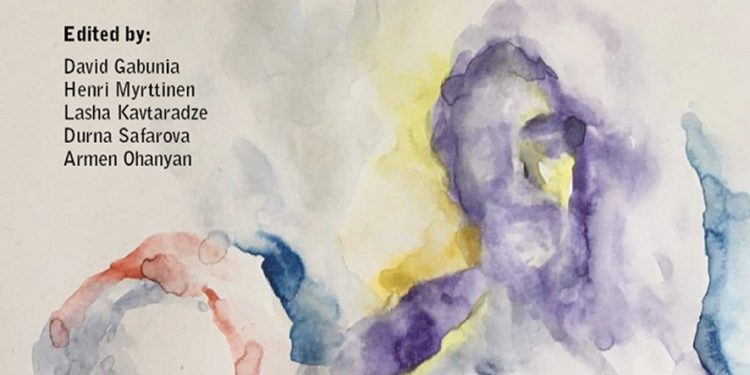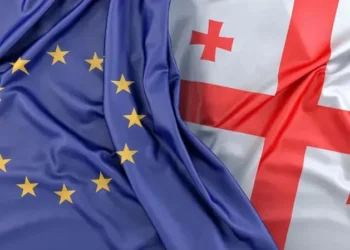Masculinities are present in practically all cultures, and they always play a role, consciously or unconsciously, through values, learning, developing a perception of the world, and interacting with others and the environment – says Tata Burduli, the gender program coordinator with the Heinrich Boell Foundation Tbilisi Office, South Caucasus Region.
The Heinrich Boell Foundation South Caucasus Office published the book ‘Masculinities in the South Caucasus’ this year. The Tbilisi Office and the Yerevan branch office are part of the larger network of the Heinrich Boell Foundation, a green think tank established in Germany that operates in countries worldwide. According to the organization’s website, their work focuses on various areas, including ecology, sustainability, democracy, self-determination and justice, gender democracy, equal rights, and political participation.
The foundation’s regional office for the South Caucasus was established in Tbilisi in 2003. Since then, numerous projects have been created to promote democracy, feminism and gender equality, sustainable use of natural resources, and more. Under those projects is a new book about masculinities within the region. The book aims to deconstruct the assumptions and expectations of masculinities in Georgia, Azerbaijan, and Armenia, and to reveal the complexities and dynamics that come with the topic.
The book is written in four languages: Armenian, Azerbaijani, Georgian, and English. Gender Program Coordinator Tata Burduli noted that while the region’s countries have historically had close ties, each country is vastly different, from the language and the alphabet to their political and cultural configuration, demonstrating the great diversity within this region. To showcase this variety, the writers were able to write in their native languages, which are placed side-by-side with the English translation, allowing the book to be accessible to a larger audience, and meaning that those who are less familiar with the region can experience the different cultures.
GEORGIA TODAY interviewed Burduli about the book to find out more.
How did this project, creating a book about masculinities across the South Caucasus, come into being?
Masculinities are omnipresent and embedded within the social fabric; they are so normalized that sometimes it can be difficult to pinpoint them or their impact, as they are perceived as a default societal set of norms. In addition, we saw that while there are several publications on masculinities in the South Caucasus countries, the field remains rather unexplored. We wanted to give space to authors and artists from the South Caucasus to reflect and share with the readers their thoughts and observations regarding the social or political issues around them, through the lens of masculinities, especially since the region and the cultures here tend to be characterized as highly masculine.
What does it mean to be ‘a man’ or to be ‘manly’ in the South Caucasus?
I would rather pose this question to the readers. Masculinities and their manifestations are diverse, and each observer has their point of view, therefore I would suggest readers approach and explore the experiences and reflections in the book.
‘Masculinity’ is commonly associated with characteristics such as physical strength, leadership and dominance, bravery, boldness, power, heterosexual virility, physical violence, etc. Feminist theories expand on these characteristics and define masculinities in higher plurality and complexity. They refer to them as a set of norms, values, roles, and behavioral patterns – to put it shortly – the expectations for ‘how to be a man’. Masculinity does more than impact self-representation and image; it goes beyond the individual level and has a much larger scale of influence. It creates and impacts the structures and functioning of societies and cultures, and tends to define gender norms. It also strongly influences all social relations (with the self and others), identity politics, political and economic structures and processes, international relations and conflicts, and even relationships with nature.
Over the past decades, the South Caucasus has experienced numerous armed conflicts and wars, the flourishing and the decline of criminal culture, varying degrees and configurations of traditionalism, religiosity, authoritarianism, and democracy, and struggles of diverse marginalized groups for equality.
These developments have always been hectic, but they are even more so today. Despite the vast differences in cultures and socio-political processes, the three countries represented in the book have major intersecting themes through the lens of masculinities, which indicates the similarities of how masculinities shape and manifest in and within individuals and societies. The themes are: Forming and Embodying Masculinities, Power, War and Masculinities, Masculinities on the Margins, and Masculinities and the Gendered Other.
How do the circumstances that support this concept of masculinities within the region vary from those in the West or elsewhere?
Every culture is unique. All processes within societies interact with each other and (re)configure how masculinities are manifested in each society or even subculture. It is even difficult to compare the three countries represented in our book, despite the intersecting themes we have outlined within. While South Caucasus societies tend to be seen as more masculine, some but not all Western cultures are perceived as less so. Plus, there are always significant differences within societies. As a currently important point, the government can play an important role here – e.g. authoritarian or autocratic regimes promote more masculine values, traditions, structures, or even policies, compared to democratic ones, though this is definitely not dichotomous, for instance, military service and extractivism are present in all types of large political systems. In addition, there are hierarchies within masculinities which are prevalent in all types of systems, including democracies, and which relate to the position of power and accumulation of resources.
The book navigates content created by 16 contributors, including academic articles, essays, and art. The themes in the book are also related to the most common issues the contributors saw in their countries during 2022-2023 when the book was being developed. According to Burduli, socially constructed masculinities are everywhere, and the way to combat them is to acknowledge, reflect, discuss, and challenge them. Since they are created by society, she says they have the potential to be adapted and reconstructed into something else.
To learn more about this topic, the e-book is available here.
Interview by Shelbi R. Ankiewicz














